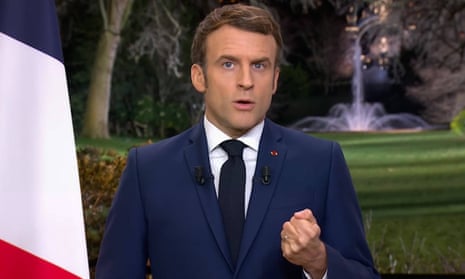Emmanuel Macron has declared “the year 2022 must be a turning point for Europe” as France took over the rotating presidency of the European Union.
In a New Year’s Eve national address, the French president hailed the EU’s role during the Covid-19 crisis and announced an ambitious agenda for the bloc that could also serve his domestic campaign for re-election.
He vowed that “you can count on my complete commitment to ensure that this period, which comes around every 13 years [for France], is a time of progress for you”.
The centrist, who made his Europhile views a key part of his campaign when winning the presidency in 2017, is hoping it will again serve him in elections scheduled for April.
“The EU presidency gives him a welcome platform to put his European record to the forefront and differentiate himself from his rivals and bring new proposals, new ideas to the table,” said Claire Demesmay from the Centre Marc Bloch thinktank in Berlin.
Prominence on the international stage has also long been a popular move for any French president.
“The French like nothing more than the image or impression of France being ‘at the controls’,” said Pierre Sellal, a former diplomat at the French mission to the EU.
Sébastien Maillard, director of the Jacques Delors Institute, a pro-EU thinktank based in Paris, said Macron will also face pressure to deliver after having ramped up expectations.
“He can’t get to the first round [of the presidential election] on 10 April without having obtained some results from the European presidency,” Maillard said. “That’s the challenge for him, but it can also be a real opportunity.”
European leaders are set to meet in Paris on 10-11 March, which could be a chance for them to agree on a major reform of the bloc’s budget rules.
Much will depend on Germany’s new chancellor, Olaf Scholz, whose coalition government is seen as sceptical on budget reforms, but supportive of Macron’s agenda.
France’s presidency is “an important opportunity we want to seize together to strengthen Europe and make it fit to rise up to tomorrow’s challenges”, the German foreign minister, Annalena Baerbock, said.
Sellal said France’s partners would take a dim view of “attempts to instrumentalise the presidency for electoral reasons”.
Domestically, opponents have already accused Macron of electioneering and say he should have delayed France’s turn at the helm until after the elections.
“It’s a mistake. He’s doing it for his own interests, not those of France,” his rightwing rival Valérie Pécresse from Les Républicains party said last month.
Eurosceptic opponents such as far-right figures Marine Le Pen and Éric Zemmour will also waste no opportunity to portray the whole exercise as meaningless.
“It’s been four and a half years that he’s been in power and he’s obtained nothing and done nothing in the European domain, apart from achieving a sort of submission to Germany in the name of the Franco-German couple,” Le Pen told RMC radio in mid-December.
